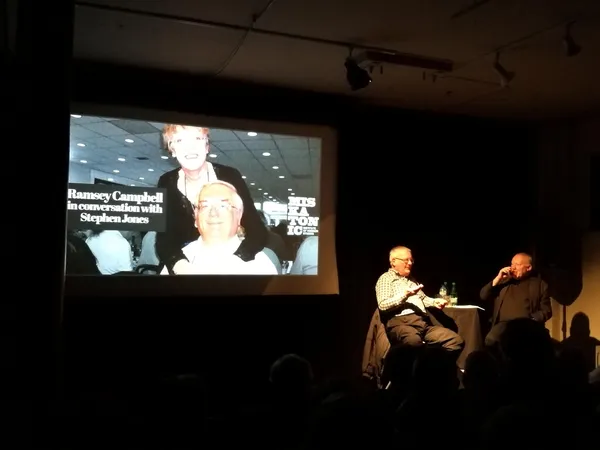 |
| Ramsey Campbell talks to Stephen Jones at the Miskatonic Institute of Horror Studies Photo: Miskatonic Institute of Horror Studies |
Founded in 2010, and opening its London branch in 2015, the Miskatonic Institute of Horror Studies is part of a new trend in education that's seeing academic lectures and discussions opened up to the public, whether they're amateur scholars like many of HP Lovecraft's heroes or simply individuals intrigued by the subject matter involved. It's also encouraging people to look in more depth at a genre that is often underappreciated by critics. With contributions from the likes of Kim Newman, Stephen Thrower and Jasper Sharp, it has covered a wide range of subjects base around books and films. We spoke to one of its organisers, Josh Saco, about how it all works.
"I've known Kier-La [Janisse] and Virginie [Sélavy] for some years now," says Josh, explaining how he got involved with the institute. "Kier-La knew of my work with Cigarette Burns Cinema, and when Virginie decided to step down, she approached me. I've been going to Miskatonic IHS London since the beginning and really respected the work both had done, and was genuinely worried if I would be able to do them justice. Fortunately, I have quite a handle on the event management side thanks to Cigarette Burns, and then of course there's the programming, coming up with topics, searching out and liaising with speakers.
"I think that in recent years the genre has certainly been given more time in academic circles. But then I suppose that's what happens quite naturally, as kids of a generation grow up, they do what interested them, normalise the once odd and obscure. Especially now, in such an interconnected world, where we can produce books with such ease, so much knowledge is just right there for us."
What kind of people attend Miskatonic classes?
"It's a wonderfully broad spectrum, absolutely everyone, with all levels of knowledge, from complete noobs who 'don't quite get the whole zombie thing' to folks who can most definitely drop the hardcore knowledge on a tutor. On top of that, it's a full range of age, gender etc, the full spectrum, which is quite exciting, far more diverse than my previous endeavours."
I ask if he feels that the intellectual side of horror is overlooked by the public at large.
"Of course," he answers. "Defending it can get boring, repetitive and invigorating. I was in the pub last night, trying to explain the nuanced differences between Slasher and Giallo... which is pretty much a lost cause after the fourth pint. But hopefully, Miskatonic IHS can help change that ever so slightly. Every bit helps. I don't think you will ever get rid of people hearing 'horror' and immediately thinking of a giant blood covered knife repeatedly stabbing someone in close up and screams. But like everything, it's about education, explaining the social relevance of 'the whole zombie thing'.
What can considerations of horror contribute to intellectual conversation more widely?
"It's the classic of understanding our fears and what drives us, but of course beyond that, the genre has always been an exciting hotbed of political commentary and groundbreaking work, whether it was making a statement about eugenics and acceptability of people who are different from you to understanding the darkness of mental illness or railing against war, loss and society as a whole. An educated fan can certainly hold their own in if they wield their films wisely."
Does he feel that the Institute's expansion reflects HP Lovecraft's own interest in what might be achieved by scholars corresponding around the world?
"That's a really lovely thought, not something I had considered, but reminds me of our Ramsey Campbell Masterclass where he was talking about his own early correspondence with the publishers of Arkham House in the run up to his first book. In this swirl of connectivity, we forgot what it was like to wait weeks or months to receive news, and the worlds we could build in our minds of where that letter landed. But I suppose the classes are microcosms of that, lecturers enjoy their classes, and in turn come to others and meet other lecturers, and so it goes.
"In April, we've got a class on a digital restoration of Nosferatu, which I'm pretty excited about and feel is really important to understand this increasingly prevalent phenomenon on our Blu-ray shelves. What are the processes and artistic decisions made to bring these "better than we have ever seen the film before" Blu-rays to our screens? The internet is overflowing with arguments and debates about what company's approach is correct. Again, education, know what you are buying, what goes on behind the scenes etc.
"And in May, we're taking a trip the West Coast of American to investigate the various crazy and dangerous cults of Manson, Jim Jones and their legacy in cinema. Meanwhile, we're currently busily working away on our Fall programme which promises to be full of all sorts of fun things.... Stay tuned!"
I ask which areas of the Institute's work he personally finds most interesting.
"I suppose the programming... Digging deeper, feeding my own brain, learning as much as the people who come along, every month is exciting. Even well trodden subjects like Folk Horror, there are always new angles and ideas that pop up that you never expect, no matter how much you think you know, someone will always uncover something or look at it in a different way."
The Miskatonic Institute's class on the restoration of FW Murnau's Nosferatu will take place on Sunday 15 April. Look out for our upcoming interview with presenter Mark Rance.





















